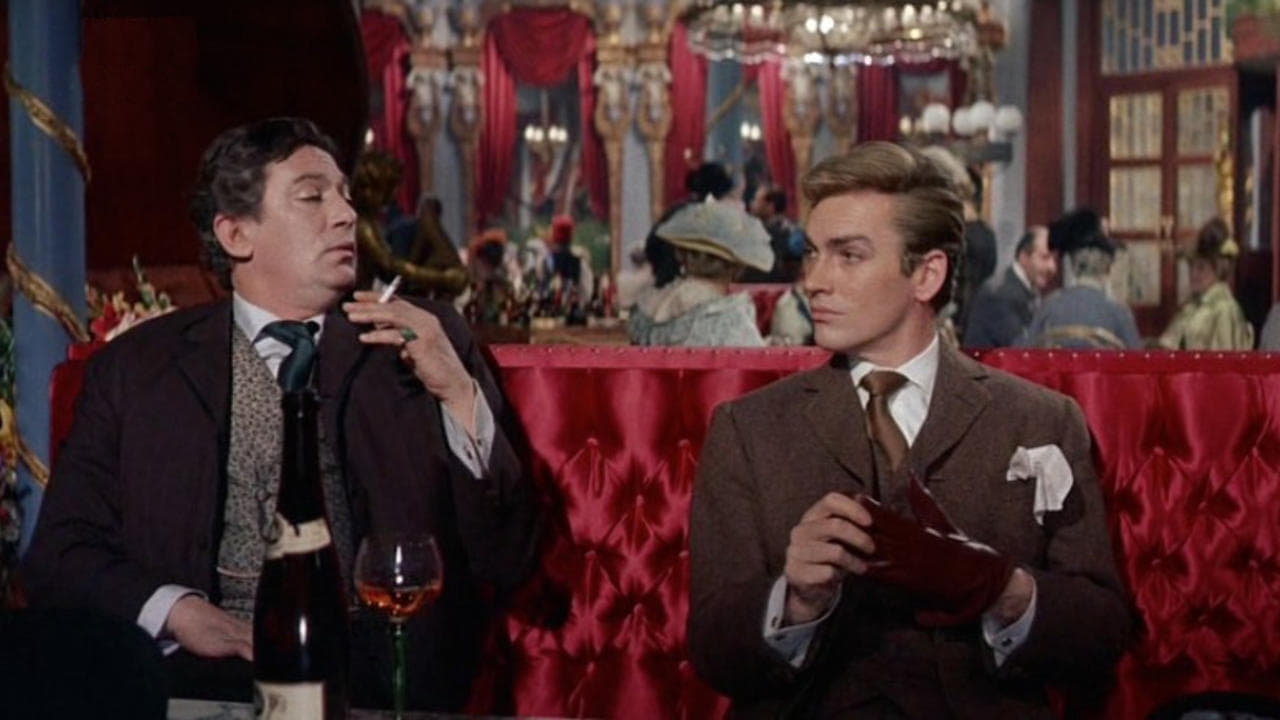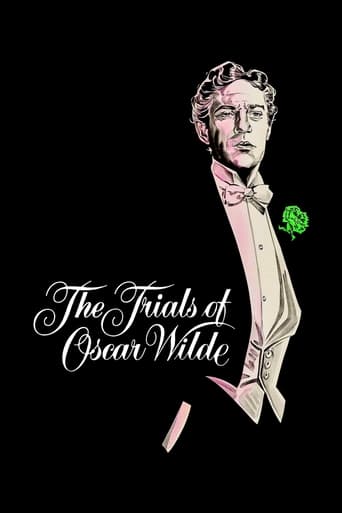

Oddly enough I had never seen this film and had just seen Oscar Wilde with Stephen Fry as the man himself. I didn't think it was very good, and after watching Peter Finch as Wilde with a fine supporting cast, I realised just how bad that one was. This, on the other hand, pulls it off in spades. The story of Wilde's rise to become the toast of London and his spectacular fall from grace within month's is well known, and The Trials Of Oscar Wilde plays it all very straight (no silly joke intended there). But it scores so well because it gets the tone exactly right and there is not one bad performance in it. Wilde was a complex man. He might now be a gay icon and regarded as a trailblazer for gay rights, but he was also a devoted and loving father for whom possibly the bitterest blow was not being able to see his children again after his release from jail. Too many have the wrong impression that he was nothing more than a flamboyant poseur, but there was, in fact, far more to him than that: he had a sound intellect, was a natural writer and he was self-aware. He was also exceptionally honest, he was kind and he was generous. Few stuck by him after his fall, but notably among his friends were Robbie Ross and Ada Leverson, who had the courage to stick by his side when too many other friends revealed themselves as fairweather folk. By his own admission, he 'went mad' for a few years and destroyed himself. The greatness of the man is very well conveyed in this version of his trials and I recommend it highly. Forget about the Stephen Fry effort, which falls flat on its face compared to this.
... View MoreFor a movie made in 1960, The Trials of Oscar Wilde was probably ahead of its time, given the general taboo against open discussion of homosexuality in that era. Just guessing, but it also may have gained the inordinate attention of the censors (such as the old Catholic Legion of Decency). I first became aware of it only the other day (Sept. 2005), when it was shown on Turner Classic Movies here in the USA. I can't believe this was the first time that a relatively tame, 45-year-old movie has been shown on American TV, but I wonder. The movie tiptoes diplomatically around the "elephant in the room," but its central theme and the intent of the producers are clear enough for adult moviegoers. (I can't remember the word "homosexual" being uttered in the dialogue, but there were unmistakable surrogates, such as "sodomite.") As a heterosexual, far be it from me to ask this question, but notwithstanding Peter Finch's fine performance in the lead role, isn't his movie "Wilde" a more masculine portrayal than the historical Wilde? Perhaps this was also a necessary concession to the time in which it was made. In any case, I also offer this spelling nitpick: the Encyclopaedia Britannica (1982) refers to Wilde's nemesis as the "Marquess of Queensberry," not "Queensbury." Also, the rules of boxing are the "Marquess of Queensberry rules."
... View MorePeter Finch gives a top drawer performance in the title role of the Trials of Oscar Wilde. It's the story of a man who was a celebrity raconteur and playwright and his fall from grace because of Victorian mores about homosexuality.Today a man like Wilde would not be compelled as Victorian society did compel homosexuals to marry and have children and deny to the world who they were and how they love. Just think that a century later after the controversy surrounding Wilde, we are discussing gay marriage and it's being legalized in many countries. Wouldn't it have all been simpler if Oscar had been allowed to marry Bosy.When the film opens Wilde is already a successful author of many plays and stories and maybe the most quoted man of wit in his time. He's married with two children, but he's got a side life as a gay man. He's got to take his partners where he finds them, a lot of street kids for the most part. And then he falls head over heels for Lord Alfred Douglas played by John Fraser. Fraser is the son of the Marquis of Queensbury, the same guy who thought up the rules for prize fighting. He's a rough and crude man played with relish by Lionel Jeffries. Of course the thought of a gay son is an abomination to him. Can't be that young Bosy is gay, it's that Wilde guy he's hanging out with.Queensbury calls Wilde a "sodomite" and Wilde foolishly decides to sue him for libel. And then the trials take place, first the civil suit and then the criminal trial because sodomy was indeed a criminal offense back in the day.I often wonder why the real Wilde did not just deal with Queensbury in one of his plays. In real life and in the film Queensbury was a boorish lout who could have so easily been caricatured and laughed out of relevancy. Queensbury retained as his attorney Edward Carson, maybe the best barrister of his day. Later on he led the Ulster contingent in Parliamant and was probably the man most responsible for those six counties of Northern Ireland remaining in the United Kingdom.Let's just say that Oscar Wilde uttered one witticism too many during his time on the witness stand and James Mason who gives a great performance as Carson just moves in for the kill. With an international gay movement in full swing now Oscar Wilde and his story may seem quaint to some, but it is relevant today to show that it wasn't that long ago that being who you were was a crime. And a reminder of where gay/lesbian/bi-sexual/transgender folks will be if our hard won rights even as incomplete as they are yet are ever allowed to recede.
... View MoreKen Hughes film 'The Trials of Oscar Wilde' may at first appear to be one of those cheesy Technicolor costume dramas when in fact it is a gripping and finely acted account of the appalling treatment Oscar Wilde received at the hands of the English justice system at the end of the 19th century.Peter Finch is superb as the eponymous hero and is totally committed to the role and turns in one of his best performances on screen. The supporting cast is also quite good if more generalized in their characterizations, more a fault of the screenplay than the performers. There is one especially fine supporting performance from Lionel Jeffries as the maniacal Lord Queensbury. Jeffries plays Queensbury as a crazed brute, a type of man we can no longer countenance in these days, though I suspect they are still out there waiting for their chance to pounce on those who they fear and do not understand.Sonia Dresdel is Lady Wilde, Oscar's dotty mother at the end of her life. It's a small part but is quietly powerful. Other people in Wilde's life, Constance, his wife, and Ada Leverson, his stalwart friend and life-long supporter, are tantalizingly glimpsed but little is revealed of their inner workings. But this isn't a film about them but about the actual trials and much of the film is spent in courtrooms. This might sound boring but it isn't.James Mason appears in the first trial as the defending witness, for Lord Queensbury, and a more vicious, narrow-minded lawyer could hardly be found, even these days.The technical credits are competent if nothing special; the music, melodramatic in a soap-opera-ish way, the sets plush and too clean. But somehow the power and tragedy of Wilde's story comes through all the gilding of the script, peppered with some of Wilde's wiser quotes, well-placed, naturally, in the text. There is nothing preachy or moralistic which is a relief, compared to the highly politicized scripts being written since this film was made.It is interesting to note Nicholas Roeg as the camera operator. He wasn't the cinematographer but I detected a few Roeg-ish touches in a couple of the more meditative scenes.This is not a film to be sluffed off as old-fashioned simply because there are no sex scenes or vulgar language or violence. The psychic violence suffered by Oscar Wilde was quite sufficient enough and this is a memorable film, worth having in the collection.
... View More